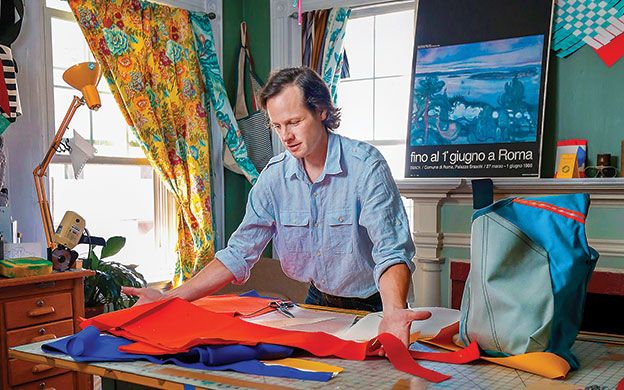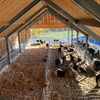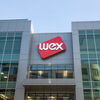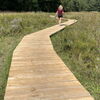Anchorpak's founder couldn't find the perfect bag — so he made his own
 Photo / Tim Greenway
Colin Sullivan-Stevens founder of Anchorpak, couldn't find a bag that was comfortable when he was biking to work, so he created one. Now, in the past year, he's sold 2,000.
Photo / Tim Greenway
Colin Sullivan-Stevens founder of Anchorpak, couldn't find a bag that was comfortable when he was biking to work, so he created one. Now, in the past year, he's sold 2,000.
In 2012, designer and artist Colin Sullivan-Stevens needed a bag for himself.
He was regularly riding his bike between his home and studio in Portland. He found backpacks inconvenient and messenger bags unstable and painful on the shoulder.
He wanted a bag that held a lot, was easy to access and was comfortable and stable enough to carry around town without wearing him out.
So he designed one from scraps of an old movie screen. The goal was a design he could position on his back for riding then, without unbuckling, reposition at his side for walking. It would be comfortable even when full. It wouldn't shift when biking.
He came up with a design, inexpertly sewed it together and went on his merry way.
As it turned out, that bag was the most comfortable one he'd ever used. It carried plenty of stuff, much like a tote or messenger bag. But the weight didn't stress his muscles. And the bag didn't shift, even when bicycling.
“The 'Aha!' moment for me was when I was doing dishes and I still had the bag on, and I was like, 'Oh, yeah!' I forgot I had it on,'” he recalls. Sullivan-Stevens made more bags and friends tried them. Reviews were positive. So in 2013, he applied for a patent on the design, formed a brand called Anchorpak, and gradually has been bootstrapping the business.
Resources are available for start-ups
Those Aha! moments are a big part of Maine's strong start-up activity. And they're why Maine has so many resources for supporting start-ups, says Stephen Lovejoy, director of the Maine Small Business Development Centers in Portland.
“Maine has a tremendous amount of services out there, and a tremendous number of funding resources,” Lovejoy says, citing MSBD, SCORE, the Maine Technology Institute, Maine Department of Economic and Community Development, Coastal Enterprises Inc. and Greater Portland Economic Development Corp., among others. He also mentions the help libraries can provide in helping to research factors such as demographics and competitors a start-up might want to consider.
At MSBD, he says, “We work with companies from startups and helping people develop business plans and do research so they have better chance of success, to older companies in need of financial restructuring. I'm working now with a company just moving here from Massachusetts that's connected to the biotech field. They see Maine as a great place to locate. And one of the things they noted is the assistance and the different players all contributing to that. I think more and more people are seeing Maine as a good place for business.”
MTI grant fuels Anchorpak
Sullivan-Stevens is already familiar with Maine as a good place for business. A Freeport native, he's a long-time designer and studio artist who co-owned a business called Field, in Portland, creating custom wall paintings and restoring murals. Field closed several years ago, and he's continued to pursue custom design and fine art at his downtown Portland workshop.
For his new business, he took advantage of just the kind of resources Lovejoy mentions.
In March, a Maine Technology Institute TechStart matching grant of $4,563 went to develop a business plan with a mentor from SCORE's Portland branch. The plan identifies outdoor and family use as top markets, and cites L.L.Bean as a model for creating well-design products that “capture a piece of Maine.”
In June, MTI awarded a matching Seed Grant of $7,320, to fund a biometric study conducted by the Motion Analysis Laboratory in the University of New England's Department of Physical Therapy. Tests will use state-of-the-art equipment including a 3D motion capture system, force plates and electromyography.
Anchorpak's functionality is based on even distribution of weight through ergonomic conformity with the body's own shape — a “mirrored symmetry,” as Sullivan-Stevens says — thus removing the stress of weight from hands, shoulders, backs and necks. The goal is to obtain objective measurements that can assist in prototype refinement. Successful results will also be incorporated in Anchorpak marketing, he says.
Lately, his workshop has been full of various types of fabrics and sewing implements. Apart from the MTI grants, Anchorpak has been self-funded. Sullivan-Stevens works on patterns and designs, which then go to Lewiston bag manufacturer Rogue Wear for production. He also works with home-based sewers. The finished work returns to his workshop, where he and two part-time employees pack it for wholesale shipment or individual orders from online sales.
The bags range from $60 for the small “Pup” bag to $167 for a larger, waxed-canvas bag.
Over the past year, he's sold about 2,000, mainly by word-of-mouth and “a tiny bit of national advertising,” through Yoga Journal.
He selected yoga practitioners as a potential market because the practice is aligned with the sort of physical well-being his bags accomplish. Wholesale accounts for about 60% of revenues. The bags are in 20 to 30 stores around New England. In June, he had an order of over 500 bags from Yale University Class of '91 for its 25th reunion. He's had displays at various festivals in Maine and New York. The bags are available online at anchorpak.com.
Sullivan-Stevens design interests were previously more artistic than functional.
“But since I've done a lot of sports and sailing, I'm sensitive to ergonomics and how outdoor, functional equipment works,” he says. “It was really my friends who confirmed my observation that this particular design works.”
The challenges of starting a company from scratch?
“It's been a challenge understanding what the product is doing, how the product works,” he says. “That's why we're doing the research. Then there's growing the business part of it. With art, the market is much less organized. But when you have a product like this, it has to fit into an existing framework of production and distribution. So getting up to speed with all the existing frameworks and operational aspects — it's not rocket science, but it's a lot of work.”
Read more
Maine entrepreneurs awarded $752K through MTI
L.L.Bean backpacks are tough competitors in a $3.1B industry
Maine tech developments receive $55K from MTI
Anchorpak, SPACE, Portland Farmers’ Market take home Indie Biz honors










Comments